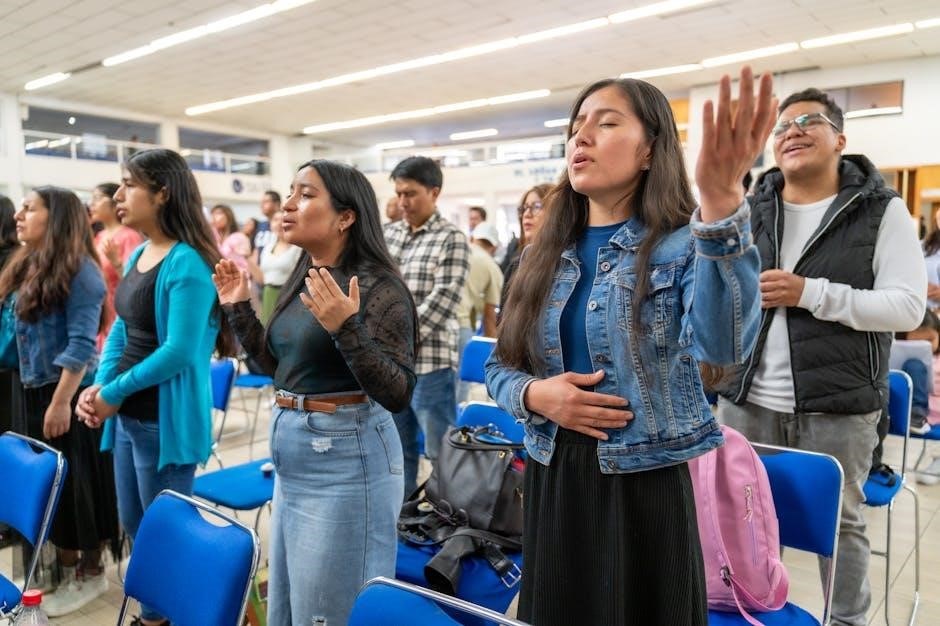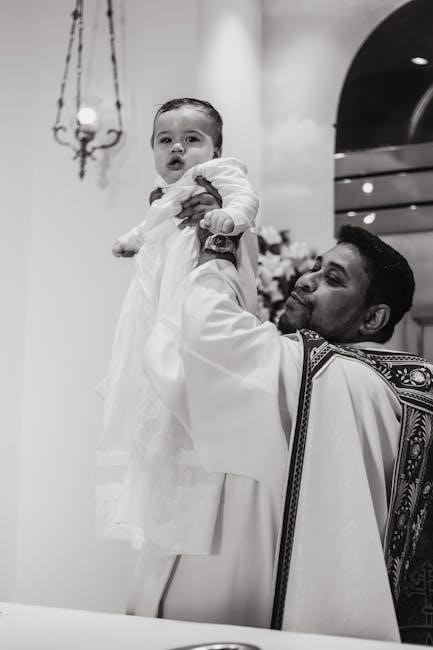The RCIA is a structured process for adults seeking to join the Catholic Church, offering a journey of faith and conversion through systematic catechesis and spiritual formation․

The RCIA Process: An Overview
The RCIA process is a structured journey guiding adults from initial curiosity to full commitment in the Catholic Church through teaching, reflection, and community support․
2․1․ The Four Stages of RCIA
The RCIA process is divided into four distinct stages: the Precatechumenate, Catechumenate, Period of Enlightenment and Purification, and Mystagogia․ Each stage is designed to deepen faith understanding, fostering spiritual growth and preparation for sacraments․ The Precatechumenate introduces the Gospel, while the Catechumenate provides systematic teaching․ The Period of Enlightenment and Purification focuses on spiritual purification, and Mystagogia integrates new Catholics into church life through post-baptismal catechesis․
2․2․ The Role of the Parish Community
The parish community plays a vital role in the RCIA process by providing support, prayer, and witness․ Through active participation in rites and ceremonies, the communitywelcomes and accompanies candidates on their faith journey․ Their involvement fosters a sense of belonging and helps integrate new members into the life of the Church, emphasizing the communal nature of Christian initiation and spiritual growth․
The Period of Precatechumenate
The Period of Precatechumenate is the initial stage of RCIA, focusing on evangelization and reflection․ It allows individuals to hear the Gospel, discern their call, and prepare for further formation․
3․1․ Evangelization and Initial Conversion
Evangelization is the cornerstone of the RCIA process, focusing on sharing the Gospel and inspiring initial conversion․ This stage involves introducing individuals to the core teachings of Christianity, fostering curiosity, and encouraging a personal encounter with Christ․ Through prayer, reflection, and community support, participants begin their spiritual journey, preparing their hearts for deeper faith formation and the subsequent stages of the RCIA process․
3․2․ Reflection on the Gospel
Reflection on the Gospel is a vital component of the RCIA process, encouraging participants to deepen their understanding of Christ’s teachings․ This stage involves exploring Gospel passages, fostering a personal connection with Jesus, and discerning God’s call in their lives․ Through prayer, discussion, and guidance from the parish community, individuals grow in faith, preparing them for the next stages of their spiritual journey toward baptism and full communion with the Catholic Church․
The Catechumenate Stage
The Catechumenate Stage is a period of deeper spiritual growth and systematic catechesis, where individuals explore Catholic teachings, doctrines, and practices, supported by the parish community․
4․1; Systematic Catechesis
Systematic catechesis provides a comprehensive and structured presentation of Catholic doctrine, morality, and prayer, rooted in the Catechism of the Catholic Church․ This phase emphasizes the teachings of Christ, the sacraments, and the Church’s traditions, fostering a deeper understanding of the faith․ Through weekly sessions, catechumens explore Scripture, liturgy, and the Christian way of life, supported by sponsors and catechists, to prepare for the sacraments and full communion with the Church․
4․2․ The Role of Sponsors and Catechists
Sponsors and catechists play a vital role in the RCIA journey, providing spiritual guidance, support, and witness․ Sponsors accompany candidates, offering encouragement and sharing their faith experiences, while catechists deliver structured teachings, ensuring a comprehensive understanding of Catholic doctrine․ Together, they foster a nurturing environment, helping participants deepen their faith and prepare for the sacraments․ Their collaboration is essential for the catechumens’ spiritual growth and integration into the Church community․
The Period of Enlightenment and Purification
The Period of Enlightenment and Purification focuses on spiritual purification and enlightenment․ It involves final preparation for the sacraments, surrendering sin, and embracing God’s grace, supported by the Church․
5․1․ Spiritual Preparation for the Sacraments
The Period of Enlightenment and Purification involves profound spiritual preparation, focusing on prayer, reflection, and surrendering sin․ Candidates deepen their understanding of the sacraments, especially Baptism, Confirmation, and the Eucharist․ This phase emphasizes purification of heart and mind, enabling them to freely receive the sacraments․ The Rite of Election marks a pivotal moment, symbolizing their commitment to the Church and their readiness to embrace the mysteries of faith․
5․2․ The Rite of Election
The Rite of Election is a sacred liturgical ceremony marking the Church’s formal acceptance of candidates for the sacraments․ Typically held on the first Sunday of Lent, it involves the bishop or his representative, who enrolled the names of the elect in a symbolic book․ This rite signifies their commitment to receiving Baptism, Confirmation, and the Eucharist, embodying the Church’s recognition of their readiness to embrace the Catholic faith publicly․

Mystagogia: Post-Baptismal Catechesis
Mystagogia is the final phase of RCIA, focusing on deepening understanding of the sacraments and integrating new members into the Church community through ongoing formation․
6․1․ Deepening Faith and Understanding the Sacraments
Mystagogia involves exploring the mysteries of the faith, especially the Eucharist and other sacraments, to deepen understanding and appreciation․ This phase emphasizes reflecting on the liturgy and living out the faith in daily life, helping new Catholics to integrate their experiences and grow in their spiritual journey within the Church community․
6․2․ Integration into the Life of the Church
Integration into the Church involves active participation in parish life, fostering a sense of belonging among new members․ This phase encourages engagement in liturgical celebrations, ministries, and community activities․ Through ongoing formation and support, individuals deepen their spiritual lives and contribute to the Church’s mission․ The parish community plays a vital role in welcoming and guiding new Catholics, helping them embrace their faith journey and live as disciples of Christ․
RCIA Materials and Resources
RCIA manuals, participant books, and leader guides provide essential resources for faith formation․ Liturgical rites, sacramental guidelines, and catechetical materials support the initiation process, ensuring comprehensive understanding and spiritual growth․
7․1․ The RCIA Manual and Participant’s Book
The RCIA Manual serves as a comprehensive guide for leaders, outlining the initiation process and providing liturgical rites․ The Participant’s Book offers a personal journey through faith, with reflections and prayers․ Together, these resources ensure a structured and meaningful experience, aiding both catechists and participants in deepening their understanding of Catholic teachings and sacraments․ They are essential tools for a transformative faith journey․
7․2․ Liturgical Rites and Sacraments
The RCIA process includes key liturgical rites such as the Rite of Election and the sacraments of Baptism, Confirmation, and the Eucharist․ These rites mark significant steps in the journey of faith, symbolizing spiritual rebirth and full initiation into the Church․ The sacraments are celebrated during the Easter Vigil, culminating the candidate’s transformation and integration into the Catholic community․ These liturgical moments are foundational to the RCIA experience․

The Role of Catechists in RCIA
Catechists play a crucial role in the RCIA process by guiding and supporting candidates through their faith journey, providing systematic catechesis and spiritual formation․ They ensure a comprehensive understanding of Catholic teachings and prepare candidates for sacraments․
8․1․ Formation and Support for Catechists
Catechists undergo extensive formation to effectively guide candidates through the RCIA process; This includes workshops, spiritual retreats, and theological training to deepen their understanding of Catholic doctrine․ Parish communities often provide ongoing support and resources, such as RCIA manuals and participant books, to ensure catechists are well-equipped․ Regular meetings and mentorship programs further enhance their ability to lead and inspire candidates on their faith journey․
8․2․ Teaching Methods and Resources
Effective RCIA teaching methods include systematic catechesis, blending scripture, doctrine, and spiritual reflection․ Resources like the RCIA Manual and participant books provide structured content․ Additional tools, such as PDF guides and liturgical rites, offer practical support․ These resources ensure a comprehensive understanding of Catholic teachings, aligning with the Catechism of the Catholic Church; They also foster engagement and faith growth among participants throughout the initiation process․

The Significance of RCIA in the Catholic Church
The RCIA is a vital process welcoming new members into the Church, fostering belonging and spiritual growth, enriching parish life and strengthening faith․
9․1․ Welcoming New Members into the Church
The RCIA process is a joyful journey for both the candidates and the parish community, fostering a sense of belonging and spiritual growth․ It provides a structured way to welcome adults into the Catholic Church, ensuring their faith is nurtured through systematic catechesis and sacramental preparation․ The Church rejoices in these moments of conversion, as new members bring fresh perspectives and enthusiasm, enriching parish life and deepening the communal faith experience․
9․2․ The Impact of RCIA on Parish Life
RCIA revitalizes parish communities by engaging members in faith formation, fostering a culture of evangelization and renewal․ It encourages active participation, deepens spiritual understanding, and strengthens the parish’s mission․ Through RCIA, parishes experience growth, as new members bring diverse backgrounds and energies, enriching liturgical celebrations and community service․ This process not only transforms individuals but also invigorates the entire parish, creating a vibrant, inclusive, and dynamic faith community․
The RCIA journey is a transformative process of faith and conversion, guiding individuals to a deeper connection with Christ and the Church, fulfilling their spiritual calling․
10․1․ The Journey of Faith and Conversion
The RCIA journey is a profound path of spiritual growth, where individuals encounter Christ, embrace the teachings of the Church, and deepen their commitment to living a life of faith․ Through prayer, reflection, and community support, participants transition from initial curiosity to full membership in the Catholic Church, experiencing a transformative conversion that enriches their lives and fosters a lifelong relationship with God․
10․2․ The Importance of Ongoing Formation
Ongoing formation is essential for deepening faith and integrating new members into the Church’s life․ It fosters spiritual growth, helping individuals apply Catholic teachings to their daily lives․ The parish community plays a vital role in supporting this journey through resources like the RCIA manual and diocesan programs, ensuring a lifelong commitment to learning and living the faith․